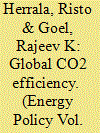| Srl | Item |
| 1 |
ID:
113488


|
|
|
|
|
| Publication |
2012.
|
| Summary/Abstract |
This paper examines global carbon dioxide (CO2) efficiency by employing a stochastic cost frontier analysis of about 170 countries in 1997 and 2007. The main contribution lies in providing a new approach to environmental efficiency estimation, in which the efficiency estimates quantify the distance from the policy objective of minimum emissions. We are able to examine a very large pool of nations and provide country-wise efficiency estimates. We estimate three econometric models, corresponding with alternative interpretations of the Cancun vision (Conference of the Parties 2011). The models reveal progress in global environmental efficiency during a preceding decade. The estimates indicate vast differences in efficiency levels, and efficiency changes across countries. The highest efficiency levels are observed in Africa and Europe, while the lowest are clustered around China. The largest efficiency gains were observed in central and eastern Europe. CO2 efficiency also improved in the US and China, the two largest emitters, but their ranking in terms of CO2 efficiency deteriorated. Policy implications are discussed.
|
|
|
|
|
|
|
|
|
|
|
|
|
|
|
|
| 2 |
ID:
150667


|
|
|
|
|
| Summary/Abstract |
In the climate agreement reached in Paris on the 12th of December 2015, the participating countries agreed to provide information about their Intended Nationally Determined Contribution, and also to assess its fairness and ambition. This study contributes a transparent empirical econometric tool for such an assessment. It shows that, using a formal decomposition framework that uniquely disentangles the macroeconomic and other influences on emissions, effort sharing in global greenhouse gas reductions can be achieved in a way that promotes innovation and environmental efficiency to reduce emissions without interfering with the right of poor countries to catch up economically. Based on GDP projections by the IMF and the OECD in a sample of about 185 countries, it presents country level CO2 emission targets applicable as benchmarks to assess the adequacy and fairness of national contributions.
|
|
|
|
|
|
|
|
|
|
|
|
|
|
|
|